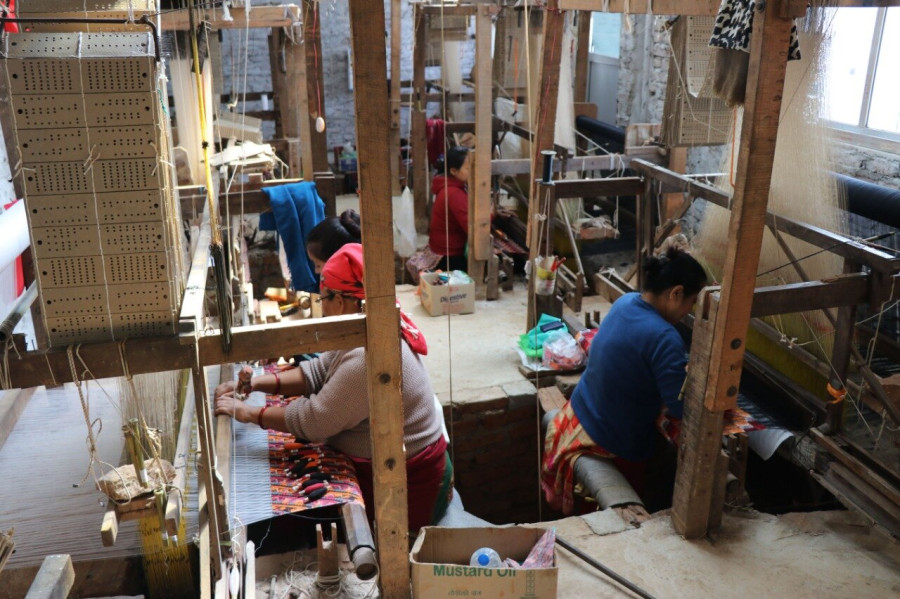Money
Most businesses still operating in the red despite end of lockdown, report says
A survey conducted by the Ministry of Industry showed that 10.81 percent of firms have shut down.
Krishana Prasain
Most Nepali businesses are still operating in the red even though the total lockdown imposed by the government to contain the spread of the coronavirus was lifted in July, a study reported.
The survey of 37 businesses conducted by the Ministry of Industry, Commerce and Supplies from November 2 to December 1 revealed that 89.19 percent of firms are operating partially while 10.81 percent have been closed completely. Among the firms that have shut down, 75 percent are small and micro enterprises.
Seventeen small and micro enterprises, 8 small-scale, 4 medium-scale and 8 large-scale businesses and factories were included in the study.
According to the report, only 13.22 percent of the businesses surveyed had made a profit. Among the profit-making firms, 66.67 were large-scale enterprises.
“Micro, cottage, small and medium-scale firms ran out of cash which resulted in many people losing their jobs,” the report said.
The firms are facing problems of raw material supply, labour mobilisation and marketisation of their manufactured goods and services, the report said.
The Department of Industry said that the ongoing political situation will have a negative impact on industry and investment that is already having a hard time due to the pandemic.
Jiblal Bhusal, director general at the Department of Industry, said the government was expected to launch special programmes and packages to assist the industrial sector in the upcoming fiscal year’s budget.
“The government is conducting the necessary studies and discussions. A meeting of the revenue advisor committee is going to be held to determine the types of tax subsidies to be provided to the industrial sector,” he said.
The study has recommended that all subsidies promised by the government be given immediately.
"Effective implementation of the monetary policy is a must," Bhusal said. He admitted that there might be procedural delays, and added that things would improve in the coming days.
The study included manufacturing enterprises like jewellery, beverage, cement, copper, brass utensils, hydropower, handicraft and readymade garment besides consultancy and other service enterprises.
According to the study, industry has not been able to operate at full capacity even though the lockdown ended last July. The study shows that the production capacity of 54 percent of businesses has declined by 50 percent. Production has fallen by 75 percent among 32.43 percent of businesses while 23.52 percent of cottage industry firms have lost 75 percent of their production.
The study also revealed that micro and cottage industry firms saw 82.35 percent of their production being impacted by the pandemic.
Similarly, 76.47 percent of micro and cottage industry firms faced problems in accessing raw materials and labour while 88.24 percent of cottage industry firms could not market their production.
With regard to small-scale industry, 87.5 percent of the businesses which participated in the study said their production was directly impacted by the pandemic.
Half of the medium-scale businesses surveyed also found it difficult to access raw materials, and 75 percent faced problems related to labour mobilisation.
Most of the workers employed in micro-scale industry lost their jobs. “More male workers were put out of work compared to female workers,” the study said.
Industry insiders had urged the government to provide a special waiver on interest, provide loans at subsidised interest, waive tax, fix electricity charges on the basis of production, extend the repayment period for loans, return value-added tax, provide refinancing service and waive rent in order to put the sector on the recovery path.
Electricity charges need to be reduced, the minimum wage should be frozen for at least two years, and excise duty and VAT should be re-evaluated, they added.
Micro and cottage industries are expecting policy from the government that can support them. They also want the sector to be declared a peace zone for two years, the report said.
Small-scale industry expects the government to prioritise the sector, reduce electricity charges and cancel the energy bills for the period the country was under lockdown, the report said.
The customs policy needs to be stabilised and the South Asian Free Trade Area (SAFTA) needs to be reviewed, the industrialists said as per the study.
The survey has recommended that large-scale industry be provided a complete waiver on advertisement tax for three years and 50 percent waiver on income tax for three years.
A special facility in tax policy needs to be provided to companies impacted by Covid-19, the report has recommended. Multinational companies that have been paying maximum tax and providing employment to a large number of people need to be prioritised while preparing policy, the report said.
Customs and VAT waiver on essential raw materials and supporting raw materials for medicine production needs to be provided, the report said.
Industry insiders also suggested providing loans at minimum interest after observing the past transactions of the company. The subsidised loan amount provided to large industry needs to be increased, and subsidised loans should be provided for at least two years, they said.
Among other recommendations, a special compensation package should be created for projects affected by Covid-19, the financing modality of hydropower projects should be changed, the payment schedule should be revised, and exclusive refinancing should be made available to energy projects to revive the sector hit by the coronavirus pandemic, the report said.




 13.12°C Kathmandu
13.12°C Kathmandu













